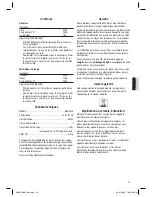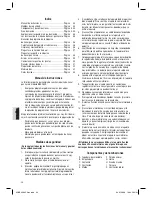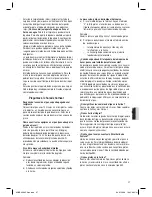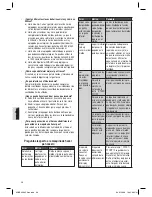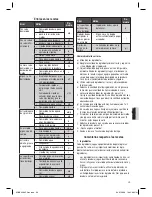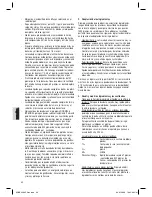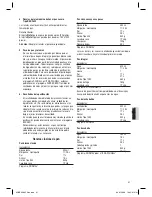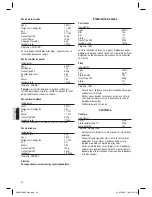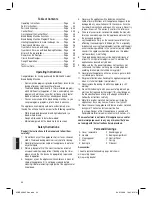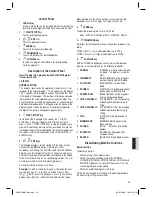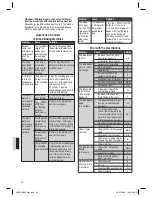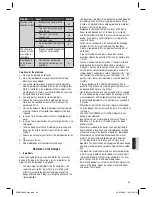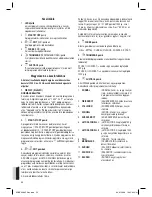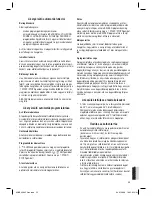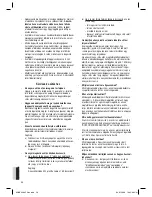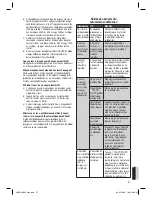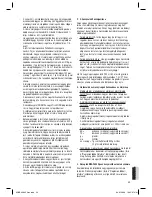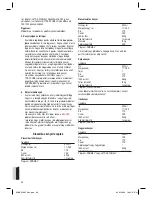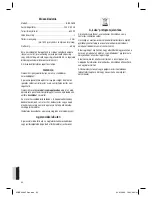
E
N
G
LI
S
H
ENGLISH
47
• Before putting the appliance away for storage, make sure
that it is perfectly cool, clean and dry. Put the appliance
away with the lid closed.
Questions & Answers on Baking
•
The bread sticks to the container after baking
Leave the bread to cool for about 10 minutes after baking
– turn the container upside down. If necessary move the
kneading peg shaft back and forth. Grease the kneading
pegs before baking.
•
How do you avoid the forming of holes in the bread
owing to the presence of the kneading pegs
You can remove the kneading pegs with your fi ngers
covered with fl our before leaving the dough to rise for the
last time. Depending on the program the display must still
show a total time of approx. 1:30 hours. If do not wish to do
so, use the hook after baking. If you proceed with caution,
you can avoid the forming of a large hole.
•
The dough spills over when it is left to rise.
This happens in particular when wheat fl our is used owing
its greater content of gluten.
Remedy:
a)
Reduce the amount of fl our and adjust the amounts of
the other ingredients. When the bread is ready, it will still
have a large volume.
b)
Spread a tablespoon of heated liquefi ed margarine on
the fl our.
•
The bread rises and spills over anyway
a)
If a V-shaped ditch forms in the middle of the bread,
the fl our does not have enough gluten. This means that
the wheat contains too little protein (it happens during
especially rainy summers) or that the fl our is too moist.
Remedy:
add one tablespoon of wheat gluten for 500 g of wheat.
b) If the bread has a funnel shape in the middle, the
possible cause can be one of the following:
– the water temperature was too high;
– too much water was used;
– the fl our was poor in gluten.
– Draft caused by opening the lid while baking.
•
When can the lid of the bread baking machine be
opened during the baking?
Generally speaking, it is always possible while the kneading
is underway. During this phase small quantities of fl our or
liquid can still be added. If the bread must have a particular
aspect after baking, proceed as follows: before the last
rising phase (Depending on the program the display must
still amount to a total time of approx. 1:30 hours.) open the
lid with caution and shortly and carve the bread crust while it
is forming with a sharp pre-heated knife, scatter cereals on it
or spread a mixture of potato fl our and water on the crust to
give it a glossy fi nish. This is the last time that the lid can be
opened, otherwise the bread will go down in the middle.
•
What do the type numbers for fl our mean?
The lower the type number, the less roughage the fl our
contains and the lighter it will be.
•
What is wholemeal fl our?
Wholemeal
fl our is made of all types of cereals including
wheat. The term “wholemeal” means that the fl our was
ground from whole grain and hence it has greater contents
of roughage thus making the wheat wholemeal fl our darker.
However, the use of wholemeal fl our does not make the
bread darker as it is widely believed.
•
What must be done when using rye fl our?
Rye
fl our does not contain any gluten and the bread hardly
rises. In order to make it easily digestible a rye wholemeal
bread with leaven is to be made.
The dough will rise only if one part of 550 type fl our is added
to every four parts of rye fl our without gluten.
•
What is the gluten in fl our?
The higher the type number, the lower the gluten contents
of the fl our are and the less the dough will rise. The highest
quantity of gluten is contained in 550 type fl our.
•
How many different fl our types are there and how are
they used?
a)
Corn, rice and potato fl our are suitable for people
allergic to gluten or for those who suffer from sprue or
celiac disease. See the relevant recipes in the operating
instructions.
b)
Spelt fl our is very expensive, but it is free from chemical
additives because spelt grows on very pool soil and
requires no fertilizers. Spelt fl our is especially suitable
for allergic people. It can be used in all those recipes
described in the operating instructions requiring fl our
types 405, 550 or 1050.
c)
Millet fl our is especially suitable for people suffering
from many allergies. It can be used in all recipes
requiring fl our types 405, 550 or 1050 as described in
the operating instructions.
d)
Durum wheat fl our is suitable for baguettes thanks to its
consistency and it can be replaced with durum wheat
semolina.
•
How can fresh bread be made easier to digest?
If a mashed boiled potato is added to the fl our and kneaded
in the dough the fresh bread is easier to digest.
•
What doses of rising agent should be used?
For yeast and leaven which must be bought in different
quantities follow the producer’s instructions on the package
and adapt the quantity to the amount of fl our used.
•
What can be done if the bread tastes of yeast?
a) Reduce the amount of sugar if sugar is being used. The
bread will be slightly lighter.
b)
Add 1,5 tablespoon of vinegar for a small bread loaf and
2 tablespoons for a large loaf to the water.
c)
Use buttermilk or kefi r instead of water. This is possible
for all the recipes and it is recommended for the fresh-
ness of the bread.
05-BBA 2605 Neu.indd 47
05-BBA 2605 Neu.indd 47
04.01.2008 10:45:03 Uhr
04.01.2008 10:45:03 Uhr

